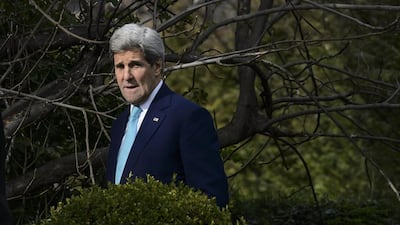NEW YORK // Negotiators seeking a framework agreement over Iran’s nuclear programme abandoned a US-imposed deadline and continued talks on Wednesday to try and reach consensus on key demands.
White House press secretary Josh Earnest said on Wednesday night that the talks continued to be productive, although Iran had still not agreed to the “specific, tangible commitments that the international community seeks”.
A spokeswoman for US secretary of state John Kerry said he would remain in negotiations until at least Thursday morning.
It came after foreign ministers from three of the six world powers who are negotiating with Tehran left the Swiss town of Lausanne on Wednesday morning amid conflicting statements over the status of the talks.
French foreign minister Laurent Fabius, whose government has taken the toughest line on Iran of all the P5+1 countries, said progress so far was “not enough” before he left for Paris. Chinese and Russian foreign ministers also left the talks.
However, a French official said Mr Fabius was on his way back to Switzerland on Wednesday night, adding that it should not necessarily be taken as an indicator that a deal was imminent.
The six countries, led by the United States and also including the UK and Germany, are trying to prevent Iran from building a nuclear bomb in exchange for the lifting of debilitating sanctions.
A deadline of March 31 was set by the White House to hash out a detailed political framework that would form the basis of further talks before a final deadline of June 30.
Iran “won’t let time bind us in the talks”, said Tehran’s head negotiator, deputy foreign minister Abbas Araghchi, after the first post-deadline meeting.
“Time is important to us but the content of the negotiations and our demands are more important.”
Two of the areas still under contention, Mr Araghchi told Iranian media, are the timeline for sanctions relief, as well as Iran’s uranium enrichment research and development capabilities. There would be no deal without a “framework for the removal of all sanctions”, he added.
The P5+1 – the UN Security Council permanent members plus Germany – want the sanctions to be lifted gradually, in line with verifiable steps made by Iran, and a curb on Tehran’s most contentious activities, including producing highly enriched uranium, for at least a decade. They also want a mechanism built into the deal to reinstall sanctions if Iran violates its terms.
The US-led powers want to curtail Iran’s ability to update its 1970s-era uranium enrichment centrifuges through research and development that would enable Tehran to more quickly build a bomb and greatly reduce its so-called “breakout” time.
Iran insists that its nuclear programme is for medical and energy purposes, and US intelligence claims that its leaders have not made the decision to build a bomb. But Tehran has also refused to explain a hidden nuclear facility that was exposed in 2009 and the military dimensions of its enrichment programme, another sticking point to a deal.
While US and EU sanctions can be suspended and reimposed relatively easily, reinstalling any lifted security council sanctions would be far more difficult.
Russia and China have reportedly resisted any clauses in a deal that would automatically bring the sanctions back into effect if Iran violates the terms. Such a clause would undermine Moscow and Beijing’s council veto.
Reaching a framework agreement is also difficult because of the competing political demands in both Washington and Tehran.
Any deal must be detailed enough for the White House to show a deeply sceptical Congress that ironclad measures are in place to prevent Iranian breakout. But it must also be vague enough to allow Mr Zarif’s government to convince Iranian hardliners that Tehran is not giving up too much to its main adversary.
tkhan@thenational.ae
* With additional reporting by Reuters

